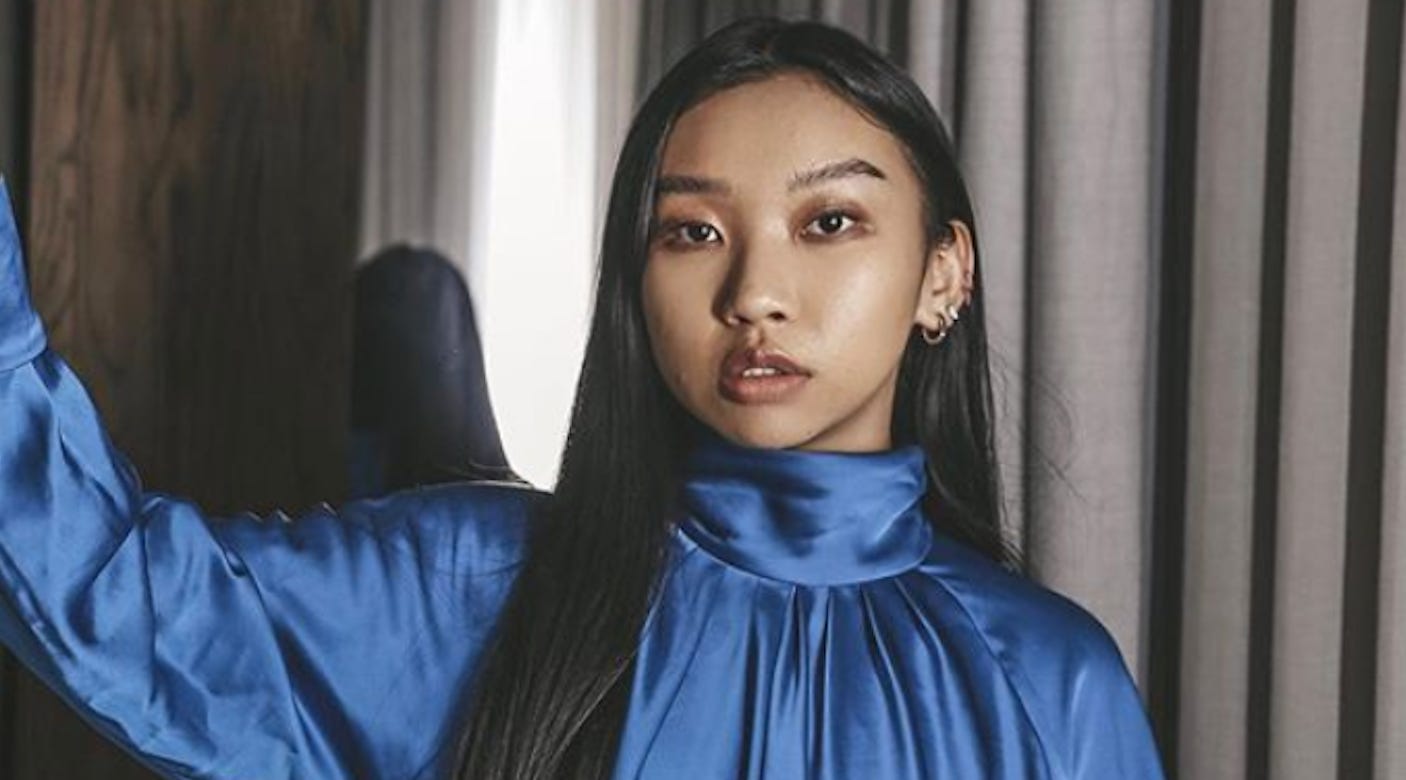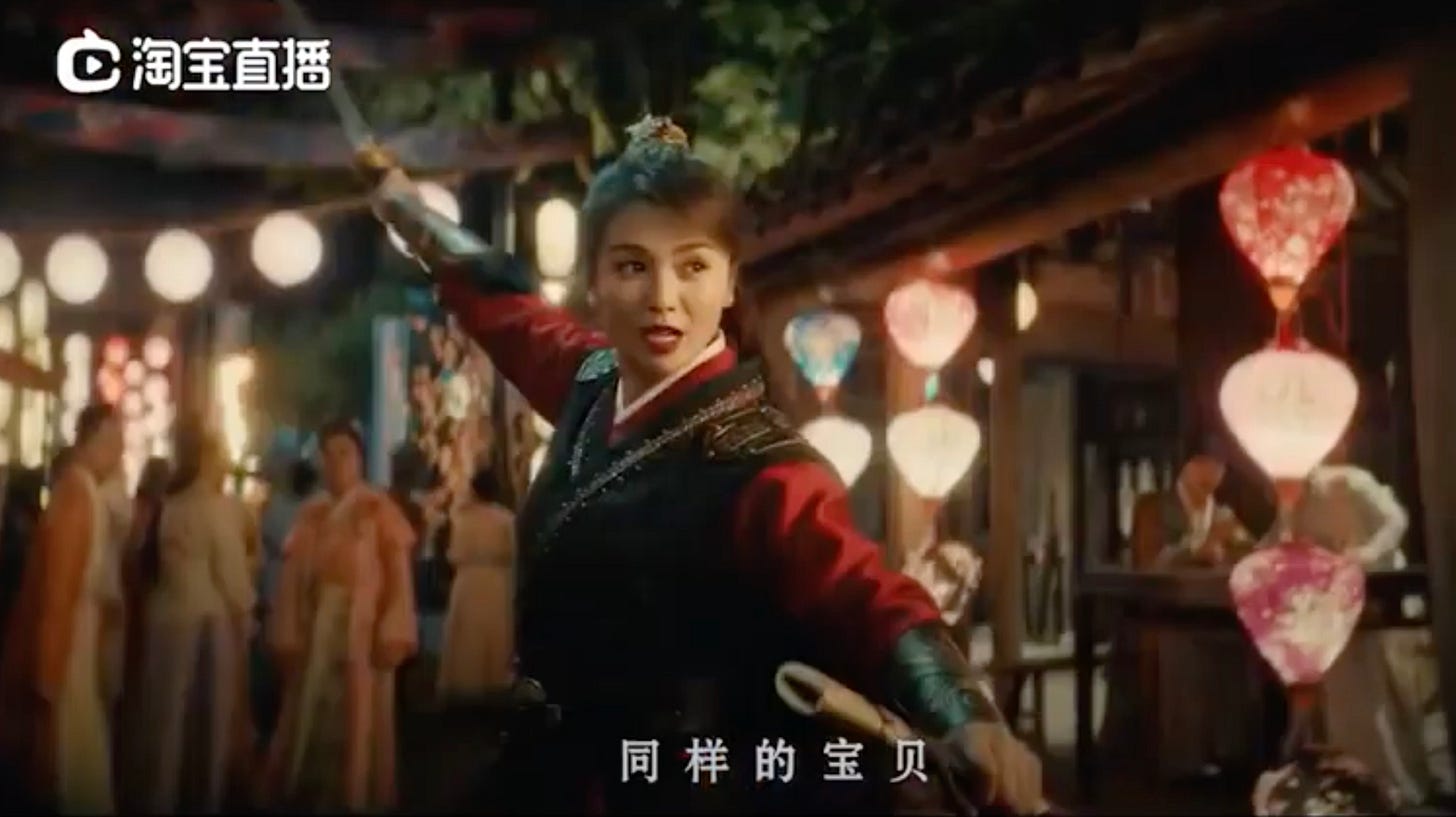CCI Insiders: Fashion Influencer Adrianna Wang
Plus: Burberry makes reality TV history, a tea vs. coffee showdown, and a News in China rundown.
The Content Commerce Insider newsletter is published twice weekly (Tuesday/Thursday) and focuses on how brands create content to drive revenue. If you have received our newsletter from a friend or colleague, we would love for you to subscribe as well.

CCI Insiders is a new interview series exploring the latest trends with the innovators working at the intersection of content, commerce, marketing, and technology.
Adrianna Wang is a fashion and lifestyle influencer who goes by the handle TheMulanShow (the木兰show). Originally from China, she has lived in Canada and New York. She got her start in the business working as an assistant beauty editor for Harper’s Bazaar in Beijing and began blogging on Chinese platforms in 2016. Wang currently has a combined 1.5 million followers across Weibo, Douyin, and the video-sharing platform Meipai.
Our wide-ranging conversation touched on why she thinks C-beauty branding powerhouse Perfect Diary is overrated, whether she'd rather be famous on YouTube or Bilibili, why she's bearish on Douyin monetization, and her take on trends in the influencer economy.
Overrated or Underrated. Let's jump in. I'll throw out some concepts — you tell me if you think they're underrated or overrated.
Monetization on Douyin, underrated or overrated?
Overrated. Douyin is about short videos. Scrolling down, it's easy to become interested in certain products. But there's so much false advertising. There's no way to properly review anything on Douyin, so Douyin products get returned — a lot. Most things there are symptoms of impulse buying.
Even if the quality of the product is really high, the quality of advertising is generally so low because of Douyin's format. You have 60 seconds and people decide within one or two seconds whether or not they’ll scroll further. Videos are shorter, so bloggers are “forced” to show the product is transformative. Photoshopped before-and-after comparisons are common. There’s a lot of hype for Douyin advertising but the return rates are terrible.
Generally, brands push their prices as low as possible for livestreaming. Then all other brands have to lower their prices and it gets less and less attractive. Nobody makes money. It's a race to the bottom. The people who like to buy cheap stuff are also the people who return everything (laughs).
You first became active on Meipai (600,000 followers) and Weibo (800,000 followers), and now you're on Douyin. So, getting on new platforms. Underrated or overrated?
Totally underrated. Scoop in, ride that first wave. Online, you never know what’s going to happen. Never say no to new forms of content. I enjoy challenging myself to create different types of content. As a blogger, that’s the only way to stay current. I’ve seen so many bloggers who were very popular and big and now they’re nowhere to be found. We have to continuously adapt to trends and what the market wants. Brands should also do this. It's a balance between putting in time on a new platform but also making sure you don't miss the train.
Perfect Diary.
Overrated. As a business they’re very successful. But the products — overrated. It’s all about building hype, not about the actual product. They make money off makeup, but their makeup is not that great. I like innovative technology.
I think every product should exist to solve a problem. Girls don't need ten different makeup palettes. I like brands like Pat McGrath's (Pat McGrath Labs). She's a black woman and she understands the struggle of having dark skin on the market. She’s solving the problem for people with dark skin. What does Perfect Diary do for problem-solving? People do think about the quality and problem-solving, and Perfect Diary doesn't do that.
Brand collaborations.
Overrated because it’s all hype.
Isn't hype good?
The right type of hype is good. But what do MAC [Cosmetics] and Honor of Kings have in common? [referring to MAC's lipstick collab with Tencent's popular mobile game]. Dior and [Nike] Air Force 1 did a collaboration. It’s cool. The products look good but…for a fashion house to come out with a collaboration with a sneaker brand: What is your message? Dior wants to be feminine. And you’re collaborating with sneaker brand…What’s your message?
So what’s the right type of hype?
Raise awareness for people to change positively. Social impact. Neiwai (内外) is a lingerie brand that also does activewear. Their message is that it's okay to look different. They hired girls with scars, older women (50-60s), and moms, and women with big boobs. Chinese women who don't fit the ideal beauty standards often feel shy and self-contemptuous. People can be very judgy. This type of judgment isn’t healthy. But Neiwai showed acceptance by highlighting their journey, and that’s really empowering.
Do you feel like that’s the direction the Chinese market is going?
A lot of brands are taking on that perspective in their social media campaign. You used to see only the smallest size at the front of the store. But now they've changed that — that's definitely going in the right direction.
What trends do you see taking off?
The common denominator for most KOLs [key opinion leaders, or influencers] is beauty and fashion. One particular direction I've seen content going into is a narrowing down of influencer types. Everyone’s now distinguishing themselves by skin-type.
The second trend is a broadening of content types, but...it's still not that popular. Most brands that aren't in fashion or beauty don’t do social cooperation with influencers. It's a chicken and egg situation: there aren’t that many influencers outside of fashion and beauty. But then when they focus on something else, they can’t monetize because non-fashion or beauty brands aren't looking on social platforms for advertising. They typically have a much harder time getting sponsorship or monetizing.
Read the full interview at Content Commerce Insider
- by Tanya Van Gastel
Mentioned in today’s newsletter: Baume & Mercier, Burberry, Dior, Douyin, Fendi, Fila, Gentle Monster, Giorgio Armani, Gucci, JD.com, MAC Cosmetics, Meipai, Montblanc, Neiwai, Nike, Pat McGrath Labs, Perfect Diary, StockX, Taobao Life, Tmall, Weibo.


Trending Brands on Chinese Reality Shows: Luxury’s First Steps
- by Ginger Ooi

In their efforts to reach new consumers, global luxury brands have shown fairly extensive willingness to experiment with their marketing in China. From partnering with major e-commerce platforms such as Tmall and JD.com, building extensive social media presences on WeChat, Weibo, and, now, Douyin, to signing up the hottest young celebrities and even making forays into livestreaming, China has transformed how luxury brands position themselves.
But reality television, one of the most popular routes for raising brand awareness among a wide audience, had remained largely untapped by the luxury sector until recently. With its participation in the third season of Youku’s critically acclaimed competition show “Street Dance of China” (这!就是街舞), Burberry has reportedly become the first luxury brand to partner with a domestic reality show.
“Street Dance” is a cultural powerhouse that appeals strongly to Gen Z and millennial viewers, integrating the worlds of hip-hop, pop, and fashion in one package. This new season of the show features an all-new cast of celebrity mentors, with brand favorites singer Lay Zhang, rapper Jackson Wang and Wang Yibo among them, with each presiding over a distinct “street” on the set that links popular trends with Chinese cultural elements.
Burberry’s involvement in the show helps link the brand to these trends and the young generation of fans. Burberry and “Street Dance” launched a co-branded box with a teddy bear and “Street Dance” souvenirs that was offered as a free gift with the purchase of Burberry products. A livestream featuring contestants from the show on Tmall Live also gave fans an opportunity to purchase exclusive product collaborations such as a logo-printed fanny pack inspired by 1990s street style.
Other brands seeing a boost from “Street Dance” and its starts include Nike, which obtained a prominent placement thanks to sneakerhead Wang Yibo’s gift of a pair of Nike SBs to each member of his team, and StockX, the online fashion resale marketplace, which recently partnered with Jackson Wang for an “initial product offering” of the singer’s Team Wang brand, which he has been wearing on the show.
Luxury brands should also be in the spotlight again on the upcoming second season of iQiyi’s streetwear-focused trend show “Fourtry” (潮流合伙人). In the first season last year, pieces from brands such as Gucci, Gentle Monster and Fendi were in the show’s celebrity-run boutique in Tokyo, and were made available for purchase via e-commerce platform Aomygod, which was one of the series’ sponsors.
CCI Take: A Content-Commerce Showdown Brews Between Tea and Coffee in China
- by Avery Booker

In recent years, powered by demand among the country’s younger consumers and middle class as well as those living in lower-tier cities, coffee has become a roughly $12 billion business in China and is expected to grow nearly 12% annually over the next five years. For major global players like Starbucks, which expects to increase the number of stores in China from around 4,300 to 6,000 over the next two years, the market is critical. Earlier this year, Starbucks announced plans to invest nearly $130 million in a state-of-the-art roasting facility in China set to open in 2022 that will become the company’s seventh in the world (it currently has five in the U.S. and one in Europe).
But it’s far from an easy market for Starbucks, with intense competition from its global counterparts like Lavazza, Tim Hortons, and Costa (which recently closed around a tenth of its mainland China stores) as well as a swelling number of domestic macro- and micro-roasters, from troubled Luckin Coffee to independent third-wave roasters throughout the country. It’s this competition — and the race to stay in front of consumers in 2020, when core customers were unable to visit brick-and-mortar stores for extended periods — that has encouraged Starbucks, in particular, to amp up its content-based marketing efforts.
Read the full article on Content Commerce Insider
Brand Film Pick: “Kung Fu Anchor” Highlights Livestreaming Star Power
- by Ginger Ooi

Taobao Live recently released a series of short brand videos under the title “Kung Fu Anchor” (功夫主播) starring top livestreamers Viya, Li Jiaqi, and actress Liu Tao, who has become one of the platform’s top-selling celebrities. Against a costume-drama backdrop of an ancient marketplace, the livestreamers appeared in the guise of martial arts masters wearing traditional Chinese garb, showing off their expertise in quality product selection and competitive pricing.
The film is the latest effort to feature Liu, an established actress with two decades of experience, as a livestreaming brand unto herself. Liu began working with Alibaba’s flash sales platform Juhuasuan back in May, with her debut of discounted offerings (ranging from paper towels to business class plane tickets) drawing RMB 148 million ($20.8 million) in sales and an audience of 20 million.
While a growing number of celebrities have jumped on the e-commerce livestreaming bandwagon, fame is no guarantee of success at sales. Liu has stood out by establishing a distinct persona as a livestreamer, known as Liu Yidao. The name (dao means sword, or knife) plays on both the martial arts roles that made Liu famous and the sharply cut prices that she offers — a livestream in July featured a prominently displayed graphic of “-50” along with Liu Yidao’s brand logo, a percentage symbol with a heart replacing one of the circles.
Backed by Alibaba, there is a clearly great deal of potential for further development of IP and content around Liu Yidao. In a new campaign, she appears in animated form as a traditional Chinese martial arts heroine, sporting a high ponytail and an oversized version of her signature sword. The animated character is at the heart of a new brand collaboration between Liu Yidao and centuries-old knife maker Zhang Xiao Quan, which features a special gift box set that includes kitchen knives and an illustrated volume from Liu Yidao titled “Nine Bargaining Tactics” (砍价九式).
News From China
Mango TV’s hit idol group competition show “Sisters Who Makes Waves” (乘风破浪的姐姐) aired its finale on September 4 with actress Ning Jing coming out victorious, followed by actress Wan Qian and former K-pop group member Meng Jia in second and third. The top seven celebrity contestants, who are all 30 and over, made their debut as the “Priceless Sisters.” during the episode. Next up, the group will star in a spin-off reality series “Sisters’ Philharmonic Journey” (姐姐的爱乐之程), that will follow their recording and touring experiences and is sure to be sought after by brand sponsors who missed out the first time around.
Actress Zhang Yuqi, who came in fourth place, was a fan favorite and is ranked as the “Sisters” contestant with the highest commercial value, according to a report from Ent Data, which based its rankings on factors such as fan followings, media coverage, and existing endorsements. Ning Jing and Wan Qian came in second and third.
Meanwhile, members of THE9, who won iQiyi’s girl group competition show “Youth With You” (青春有你) earlier this year are starring in another reality series, “Not Your Average Party”(非日常派对), which takes the format of a challenge-oriented game show with additional celebrity guests appearing. The fashion social e-commerce platform Xiaohongshu is the title sponsor of the show, paving the way for more commercial opportunities for the band.
Douyin and Kuaishou continue to battle it out for celebrity dominance as they seek to draw more fans of top stars to promote audience engagement and potentially drive e-commerce sales via livestreaming. Kuaishou managed to secure legendary music icon Jay Chou earlier this year, and recently followed up by appointing actor Chen Kun as the platform’s new brand spokesperson (he has also represented Giorgio Armani, Baume & Mercier, Montblanc, and Fila). Meanwhile, Bytedance’s Douyin boasts more than 2,500 celebrities on its platform, with popular stars including idols Kris Wu and Cai Xukun, and actors Angelababy and Chen He.
Idol Jackson Yee is a brand favorite who has worked with the likes of Giorgio Armani, BMW, Tiffany & Co. and Bulgari, and recently topped the Forbes list of the top 100 Chinese celebrities. He is also a Tmall brand ambassador, and now has a virtual avatar called Qian Miao to help him represent the powerful e-commerce platform. Qian Miao is Tmall’s first virtual spokesperson and was launched with weeklong campaign that invited fans to join the virtual world Taobao Life (淘宝人生), where their own avatars could take pictures with Qian Mao and interact with virtual idol through the game Baba Farm (芭芭农场), with participants entered into drawings for a Qian Mao figurines, postcards, and other souvenir products.
News in English
Luxury brands continue to open stores in China to meet consumer demand, even as they cut back elsewhere in the world. Vogue Business
A look at the pros and cons of five niche e-commerce platforms, some of which offer more actively engaged users and a targeted focus on premium brands. WalktheChat
Like a “pretty weird Chinese meal” from a Western restaurant: Early reviews of Disney’s Mulan from viewers who obtained pirated copies ahead of the film’s September 11 release have not been kind. SCMP
And #boycottMulan calls are mounting in other Asian markets as a result of lead actress Liu Yifei’s comments in support of Hong Kong’s police during last year’s democracy protests, while Disney faces a fresh wave of criticism in the U.S. over the use of Xinjiang as a shooting locale. The Hollywood Reporter / Bloomberg
None of the single ladies: A Chinese jewelry brand is under fire for discouraging women from buying diamond rings for themselves. Sixth Tone
Chinese bottled water brand Nongfu Spring had a splashy debut on the Hong Kong stock market, as investors bet big on Chinese consumer demand. Wall Street Journal
The luxury crystal brand Baccarat has found itself under the protection of a French court amid the financial downfall of its Chinese owner, the family-run Fortune Fountain Capital. SCMP
Shanghai plans to organize four more major shopping festivals during the remainder of the year, following up on the success of its Double Five promotion that ran from May to July. Yicai Global
We’ve Got China Covered
China Film Insider: Christopher Nolan’s ‘Tenet’ Nabs $30 Million During First Three-Day Debut in China
Jing Daily: How Gucci, LV Leveraged China to Survive Covid-19
Jing Travel: How Versailles Forges New China Connections Under Lockdown
Thank you for reading! We will be back next Tuesday with more news and trend reports. Until then, we hope you have a productive rest-of-your-week and relaxing weekend.


